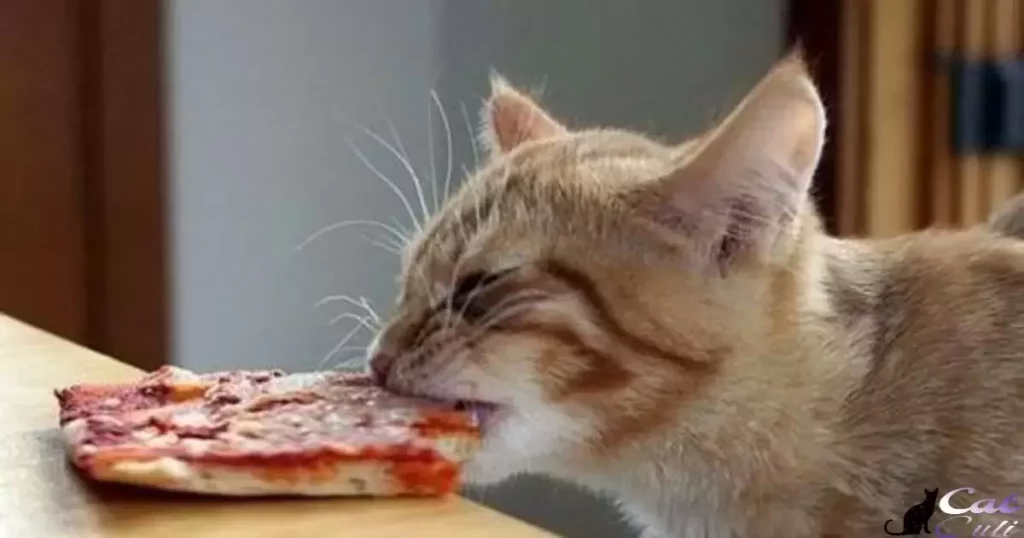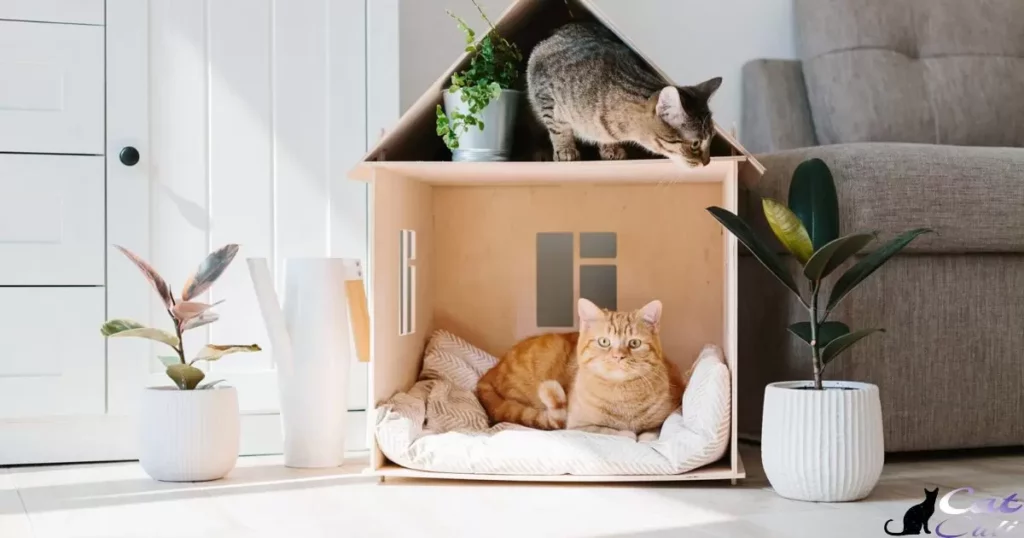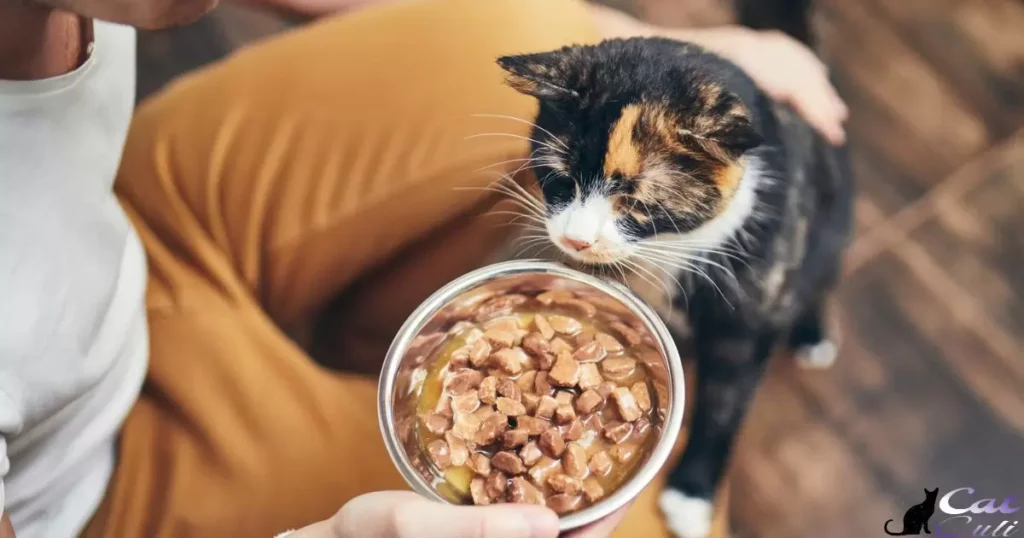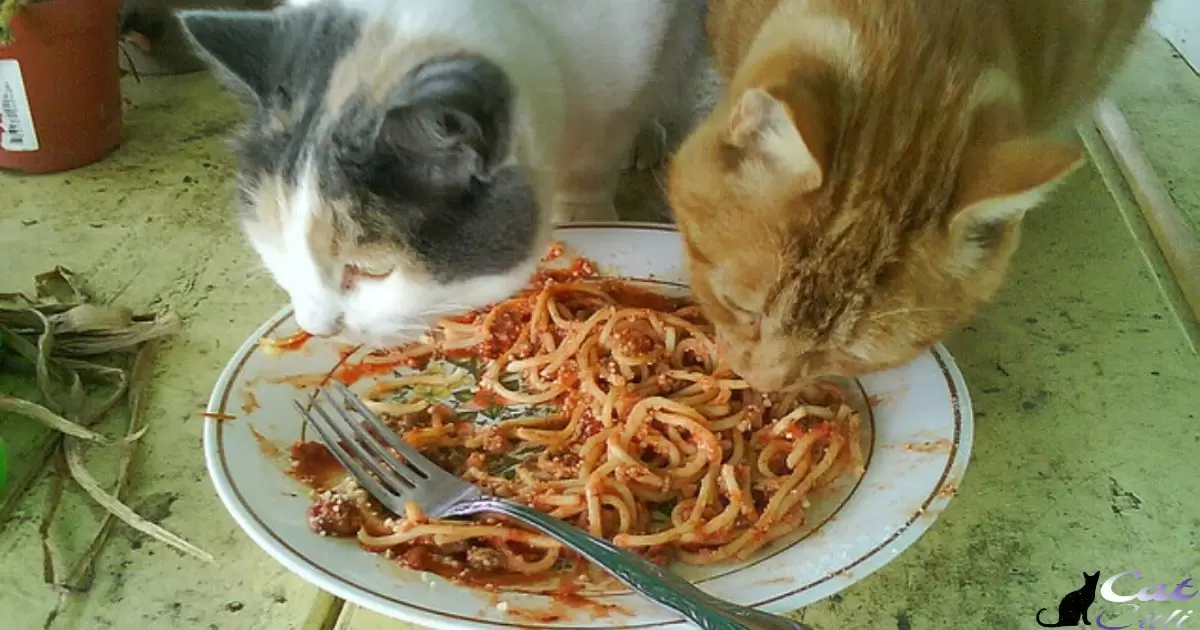When a cat allows other cats to eat its food, it might signal a sense of community or sharing. Cats may do this out of goodwill or because they don’t feel threatened by the other cats. Sometimes, it’s a sign of hierarchy or submission, where the cat sees the other cat as dominant.
Ever wondered why your furry friend seems okay sharing their grub with other whiskered pals? Why Does My Cat Let Other Cats Eat His Food? is a puzzling query many cat owners encounter. It’s not just about sharing kibble; it’s a feline social code revealing intriguing insights into your cat’s behavior.
It could stem from a sense of community or hierarchy among them, where sharing food is a natural aspect of their social dynamics. Understanding why your cat does this can unveil fascinating insights into their social behavior and interactions with other feline friends.
Problems With Feeding Your Cat
Feeding your cat can pose various challenges. Overfeeding might lead to obesity and health issues. Secondly, underfeeding can cause malnutrition and affect your cat’s overall well-being. Ensuring a balanced diet and appropriate portion sizes is crucial to prevent these problems.
Inconsistent feeding schedules might disrupt your cat’s routine and cause digestive problems. Feeding inappropriate or low-quality food can impact your cat’s health negatively. Providing a consistent and nutritious diet is essential for maintaining your cat’s health and vitality.
One Cat Is Eating The Other Cat’s Food
When one cat eats another cat’s food, it often signals a territorial or dominance issue. The cat consuming the other’s meal might assert its control or show a higher rank in their hierarchy. This behavior can stem from competition for resources or an attempt to establish dominance over the other cat’s possessions.
It’s common for cats to safeguard their food, and a cat eating another’s meal might provoke tensions or disagreements between the felines. Such actions typically relate to asserting dominance or defending territory, and understanding this behavior helps in managing their interactions peacefully.
Ways To Stop Your Cat From Stealing Your Other Cat’s Food
To prevent your cat from snatching another’s food, try feeding them separately in different rooms. Establish a feeding routine with specific meal times to ensure each cat eats undisturbed. Use elevated or closed feeding stations to deter food theft and give each cat their designated space to eat peacefully.
Gradually transition them to associate feeding time with their individual spots, reducing the urge to steal from one another. Consistency and separation during meals can curb this behavior effectively.Consider using timed automatic feeders that dispense food at set intervals.
These devices provide controlled portions for each cat, minimizing the opportunity for one cat to steal from the other. By implementing these strategies, you create a more harmonious feeding environment, reducing the chances of food theft between your furry companions.
Create Separate Feeding Areas
Establish distinct feeding spots for each cat in different rooms or corners of the house. This helps prevent competition during mealtime and reduces the likelihood of food theft or conflict between cats.
Swap Bowls
To promote harmony, swap the food bowls between your cats at mealtime. Allowing each feline to explore the other’s bowl before eating diminishes the novelty of the food, potentially reducing the temptation to snatch meals. This process can also help familiarize them with different food temperatures, reinforcing the idea that Cats Like Warm Food.
Use Microchip Feeders
Employ specialized feeders that open only for a designated cat’s microchip or collar tag. This technology ensures that each cat accesses its individualized food portion, preventing one cat from consuming another’s meal.
Reasons Why Your Cat Might Be Stealing Your Other Cat’s Food

Your cat might steal food from another because of hunger or preference for different tastes. Sometimes, it’s a way to establish dominance or assert control over territory. Cats may also snatch food due to anxiety or stress, feeling the need to secure additional resources.
Understanding these reasons can help manage feeding dynamics and create a harmonious environment for your feline companions.Another reason for food stealing could be the lack of individual feeding spaces or competition for resources.
Cats may resort to taking others’ food if they perceive a scarcity of their own. Introducing separate feeding areas or timed feedings can help address this behavior and ensure each cat gets their fair share without the need for food thievery.
What Happens If An Adult Cat Eats Kitten Food?
| Impact of Adult Cat Eating Kitten Food | Explanation |
| Nutritional Imbalance | Kitten food is higher in calories, fats, and proteins to support growth. Over time, this excess intake can lead to weight gain and potential health issues for adult cats, such as obesity. |
| Digestive Upset | The high protein content in kitten food might strain an adult cat’s digestive system, causing discomfort, diarrhea, or vomiting due to an overload of nutrients not suited for their digestive needs. |
| Mineral Imbalance | Kitten food often contains higher levels of certain minerals like calcium and phosphorus. Prolonged consumption by adult cats can upset the delicate balance required for their health, potentially leading to urinary issues like bladder stones or urinary tract problems. |
| Potential for Malnutrition | While kitten food is formulated to meet specific growth needs, adult cats might miss essential nutrients found in adult cat food. Extended consumption could lead to deficiencies affecting their overall health and wellbeing. |
This table outlines the possible consequences of an adult cat consuming kitten food, highlighting the nutritional imbalances, digestive issues, mineral imbalances, and risks of potential malnutrition that can arise from prolonged intake of kitten-specific nutrition.
Why Does My Cat Steal The Other Cat’s Food?
When one cat steals another cat’s food, it’s often a sign of competition or a desire for a different taste. Cats might steal food due to their natural instincts, seeking variety or asserting dominance. This behavior can occur when one cat perceives the other’s food as more appealing or simply wants to establish control over the feeding area.
It could also result from a cat feeling more confident or dominant and wanting to assert that status by taking over another cat’s food bowl. Understanding these feline behaviors can help manage feeding routines and maintain harmony among the furry companions.
How To Stop A Cat Eating Another Cat’s Food
To prevent one cat from gobbling up another’s meal, try feeding them separately in different rooms. Use designated feeding spots for each cat to establish boundaries during mealtime. Supervise their feeding sessions, ensuring they stick to their own bowls. Adjust their eating schedules to minimize the chance of one cat swooping in on the other’s food.
Another tactic involves timed feeding, offering meals for a set period, then removing the bowls. This helps control the time each cat has to eat and prevents one from dominating the other’s food. Consider using specialized feeders or puzzles that dispense food gradually, making it harder for one cat to finish off the other’s meal.
Establish A Routine And Separate Resources
- Mealtime consistency: Set regular feeding times for each cat to establish a routine.
- Separate feeding areas: Designate specific locations for each cat’s food and water bowls.
- Supervision during meals: Monitor feeding sessions to ensure each cat stays with their own food.
- Resource allocation: Provide individual toys, beds, and litter boxes for each cat to prevent conflicts.
- Maintain consistency: Stick to the routine to reinforce boundaries and minimize food disputes.
If Your Cat Eats The Other Cat’s Food Everybody Loses. Why Does This Happen?
When your cat eats another cat’s food, it disrupts the balance. It causes both cats to miss out on their proper meals, leading to dissatisfaction. This behavior can occur due to various reasons such as hunger, preference for a different taste, or territorial instincts.
Understanding why this happens is crucial for maintaining harmony. Cats might do this out of curiosity, hunger, or even to establish dominance. Ensuring separate feeding areas and supervising mealtimes can help prevent this issue and ensure each cat gets the right food and portions they need.
Is There Any Solution To Resolve This Problem?
Finding a solution to resolve this issue is crucial. You can start by observing your cat’s behavior closely to understand the root cause. Providing separate feeding areas or timed feedings might help curb food-sharing among your feline friends.
Ensuring each cat has its designated food bowl and enough space can aid in reducing conflicts during mealtime.Addressing this problem involves proactive steps. Consulting a veterinarian or an animal behaviorist can offer tailored strategies to manage this issue effectively.
Why Does My Cat Let Other Cats In The House

Cats might allow other feline pals inside for various reasons. They might feel comfortable with those cats, seeing them as part of their territory. It could also signal a friendly or non-threatening relationship between the cats. It’s about social interaction and companionship, showing a relaxed attitude towards other cats sharing their space.
When your cat welcomes other cats indoors, it’s often a sign of their confidence and social nature. They might enjoy the company or find safety in numbers, creating a more communal atmosphere within the house. This behavior reveals their social instincts, showcasing their ability to coexist and establish bonds with other cats in their environment.
Why Do My Cats Take Turns Eating
Cats take turns eating to establish a sense of order and hierarchy during mealtime. This behavior is their way of respecting each other’s space and maintaining peace within the group. By rotating turns, they avoid confrontation and potential conflicts over food, ensuring a harmonious dining experience among them.
This turn-taking habit also stems from their natural instincts. In the wild, cats often share a common food source, and taking turns helps them avoid fights and promotes cooperation among the group members. It’s a subtle yet effective way for cats to maintain social balance while enjoying their meals together.
Neighbours Cat Eating My Cats Food
My neighbor’s cat keeps munching on my cat’s food! It’s a daily visit, and my cat doesn’t seem to mind sharing. They meet at the bowl, nibble together, and carry on as if it’s routine. I’ve noticed this happens when my cat finishes eating and leaves some leftovers.
I’ve tried separating the bowls, but it’s like a magnet for the neighbor’s cat. My feline seems unbothered, almost like it’s an accepted arrangement. It’s become a quirky part of their routine, where they share a meal like old pals.
Do Cats Tell Other Cats Where Food Is
Cats communicate through various means, such as body language, vocalizations, and scent marking, to convey the location of food to other cats. They might use behaviors like rubbing against objects or leaving scent marks to signal where food is located. Vocal sounds and meows can serve as indications of food presence
Through active communication methods like scent marking or vocalizations, cats effectively convey the location of food to other felines. Their behaviors, including rubbing against surfaces or emitting specific sounds, serve as clear signals, enabling them to communicate and share information about the food’s location within their environment.
My Cat Won’t Let My Other Cat Eat
Cats can be possessive over their food bowls, and this behavior could stem from a desire to establish dominance or protect their resources. Introducing separate feeding areas or feeding them at different times could help alleviate this tension and ensure both cats get their fair share of meals without conflict.
Understanding the root cause of this behavior is crucial. Cats might also display this behavior due to stress or anxiety. Creating a calm environment and providing individualized attention to each cat can help reduce conflicts over food and foster a more harmonious relationship between them.
My Cat Waits For Me To Eat

My cat eagerly waits for me to eat, sitting nearby with hopeful eyes. She’s always there, curious and attentive, perhaps hoping for a treat or a playful moment. It’s her routine, a time when she feels close and connected, sharing a quiet moment while I enjoy my meal.
Whenever I sit down to eat, my cat becomes my dining companion, watching my every move. She sits patiently, her tail swishing with anticipation, ready to join in or simply keep me company. It’s a sweet ritual we share, a moment of companionship and warmth during mealtime.
How Do I Stop My Neighbour’s Cat From Eating My Cat’s Food?
You can use elevated feeders or place the food in a room your cat can access easily but the neighbor’s cat can’t. Consider scheduling feeding times so you can remove the food after your cat finishes eating, reducing the opportunity for the neighbor’s cat to sneak in for a meal.
Another effective strategy involves talking to your neighbor about the situation politely. They might not be aware of their cat’s visits. Requesting their cooperation to keep their cat away from your home or to adjust their feeding times could help solve the issue amicably, ensuring your cat enjoys its meals without any unwanted guests.
Do Cats Get Bored Of The Same Cat Food?
Cats might get bored with the same food over time. They enjoy variety in their meals, so feeding them the same thing daily might lead to disinterest. Introducing different flavors or rotating their meals could keep their curiosity alive and prevent mealtime monotony.
To prevent boredom, try mixing up their food occasionally or introducing new flavors and textures. Cats often appreciate a change in their diet, ensuring they stay engaged and excited about their meals. Keeping their food options diverse can help maintain their interest and enjoyment during mealtime.
FAQ’s
Do cats like each other if they eat together?
Cats eating together can build camaraderie, but it doesn’t guarantee liking. It’s more about comfort and social dynamics.
Do cats remember who feeds them?
Yes, cats have a good memory for routines. They’ll likely remember the one who regularly feeds and cares for them.
Do cats know humans feed them?
Cats associate humans with food and care. They may not understand the concept of feeding, but they recognize the provider.
Conclusion
Cats may share food due to communal instincts, hierarchy, or a lack of territorial concerns. It’s a complex mix of social dynamics, where sharing may signal comfort or submission among them. Recognizing this behavior helps foster a harmonious environment among multiple cats.
In essence, decoding Why Does My Cat Let Other Cats Eat His Food? sheds light on their social intricacies. It’s not just about sharing meals it reflects their social bonds and how they perceive their feline companions. Appreciating this behavior aids in creating a nurturing and understanding atmosphere, fostering better relationships among cohabiting cats.








